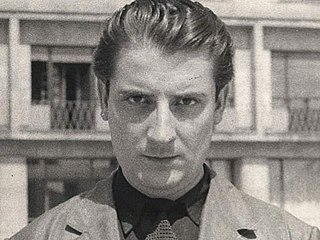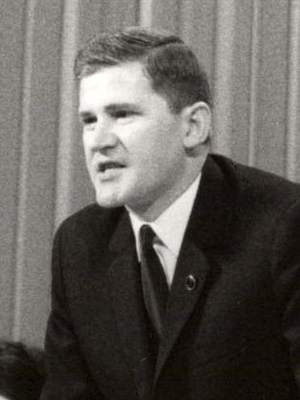Related Research Articles
Baron Avro Manhattan was an Italian writer, historian, poet and artist. A born aristocrat who wrote about various political topics throughout his career, Manhattan is perhaps best remembered as the author of several works discussing the Vatican's role in world politics and global affairs. Manhattan attended both the Sorbonne and the London School of Economics.

Branko Ćopić was a Yugoslav writer. He wrote poetry, short stories and novels, and became famous for his stories for children and young adults, often set during World War II in revolutionary Yugoslavia, written with characteristic Ćopić's humor in the form of ridicule, satire and irony.

Saša Lošić "Loša" is a Bosnian recording artist. He initially rose to prominence as the lead vocalist of the Bosnian-based music act Plavi orkestar, which is one of the most popular music bands of the former Yugoslav Pop and Rock scene.

Harry Carroll was an American songwriter, pianist, and composer.

Aleksije "Branko" Radičević was a Serbian poet who wrote in the period of Romanticism.

Branko Miljković was a Serbian poet.

Branko Mikulić was a Yugoslav politician who served as Prime Minister of Yugoslavia from 1986 to 1989. Mikulić was one of the leading politicians in Bosnia and Herzegovina during the communist rule in the former Yugoslavia. He was a member of the Presidency of Yugoslavia for SR Bosnia and Herzegovina from 1984 to 1986, and previously served as President of the Presidency of SR Bosnia and Herzegovina from 1982 to 1983.

Branko Kostić was a Yugoslav politician, businessman, and university professor.
Stephen George "Steve" Pratt is a former Australian military officer, aid worker and politician in the Australian Capital Territory Legislative Assembly. He wrote a book titled Duty of Care about his life experiences, including being imprisoned in Serbia while tending to the refugee crisis there in 1999.

Branko Grahovac is a Bosnian-Herzegovinian retired footballer who played as a goalkeeper.
Viktor Novak was a Yugoslav Croat historian, professor at the University of Belgrade and full member of the Serbian Academy of Sciences and Arts (SANU), and a corresponding member of the Yugoslav Academy of Sciences and Arts (JAZU).
Edmond Paris was a French author on history and anti-Catholic polemicist.
Branko Ostojić is a Bosnian Serb footballer who plays as defensive midfielder for Sloboda Čačak.
The 538th Frontier Guard Division, also known as the Division z.b.V. 538. was a short-lived German division in World War II that participated in the invasion of Yugoslavia. It was disbanded immediately after the Yugoslav surrender.
Branko Petranović was a Serbian historian and a Belgrade University professor specializing in history of Yugoslavia.
Branko Plavšić was a Serbian comic book artist, best known for his work on Tarzan and Blek.
Branko Dobrosavljević was a Serbian Orthodox priest who was killed by the Ustaše during the Genocide of Serbs in the Independent State of Croatia in World War II.
Djoko M. Slijepčević was a Serbian church historian. Slijepčević was also a staunch anti-Communist, who left Yugoslavia in 1945 when the Communists seized power. He wrote numerous books about Yugoslav communist tactics in Europe, and crimes of the leadership of the Independent State of Croatia against the Serb population during World War II.

Branko Popović was a Serbian painter, art critic, professor and dean of the Engineering Faculty at the University of Belgrade. He was also an accomplished architect.
Nikola Vujčić is a Serbian author and poet.
References
- ↑ "Мира Адања Полак: Ексклузивно – Бранко Бокун – 58 година после".
- ↑ name="Biography">cite web |url=http://www.vitabooks.com/files/cv.pdf |title=My Life, so Far |first=Branko |last=Bokun |date=26 June 2007 |website=Vitabooks.com |url-status=dead |archive-url=https://web.archive.org/web/20071008181921/http://www.vitabooks.com/files/cv.pdf |archive-date=8 October 2007
- ↑ name="Biography"
- ↑ Cite web|url=https://foxedquarterly.com/branko-bokun-spy-in-the-vatican-literary-review/%7Ctitle=Vatican Evasions|date=June 2008
- ↑ name="Biography"
- ↑ name=obit> "Branko Bokun: Elegant Balkan writer who for half a century lit up the cafés of Chelsea with delicious stories of encounters with the great and the good", The Times , 16 April 2011 (subscription required)
- ↑ name="Biography"
- ↑ name=obit
- ↑ name=vita>Cite web |url=http://www.vitabooks.com/ |title=About Vita Books |date=5 January 2011 |website=Vita Books |quote=Vita Books regrets to announce the death of Dr. Branko Bokun aged 90 on Saturday 1st January 2011 in Chelsea and Westminster Hospital after a short illness. He is survived by his son and two grandchildren and many who regarded him as father, mentor, and friend. R.I.P. |archiveurl=https://web.archive.org/web/20110202142527/http://vitabooks.com/ |archivedate=2 February 2011